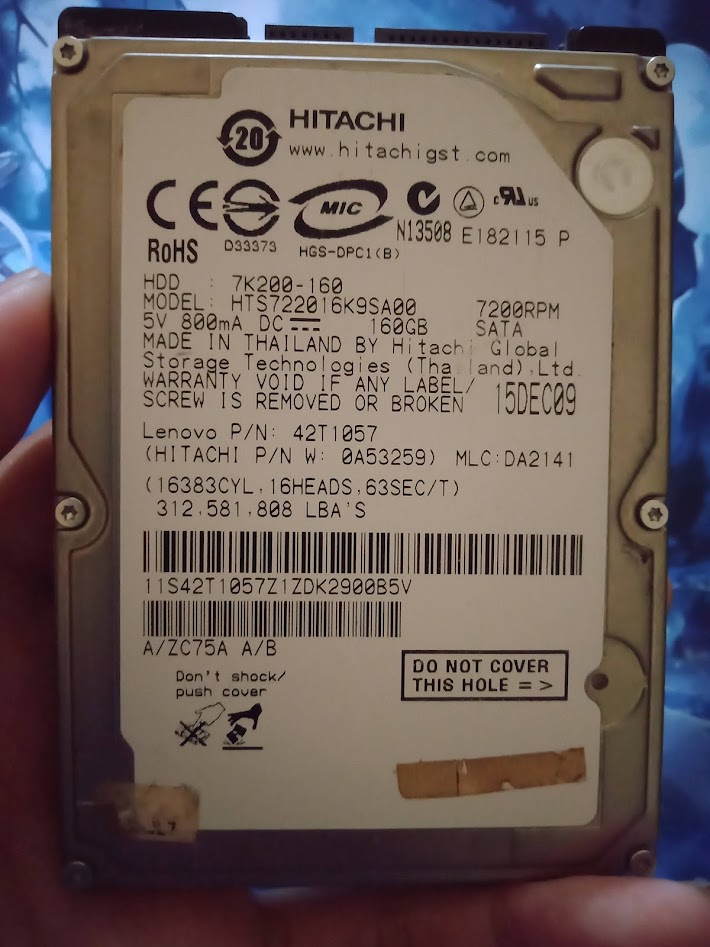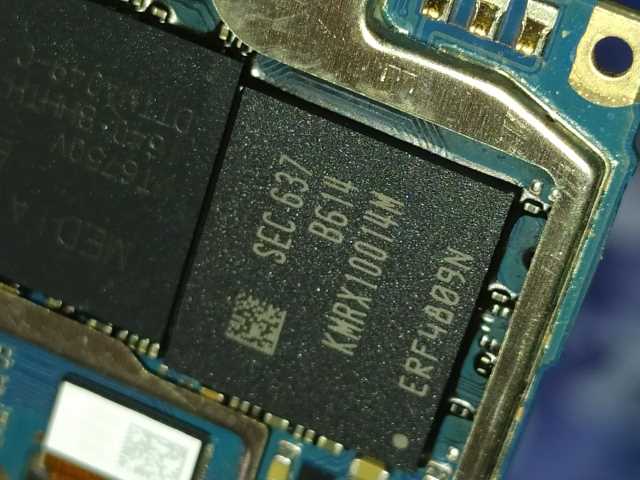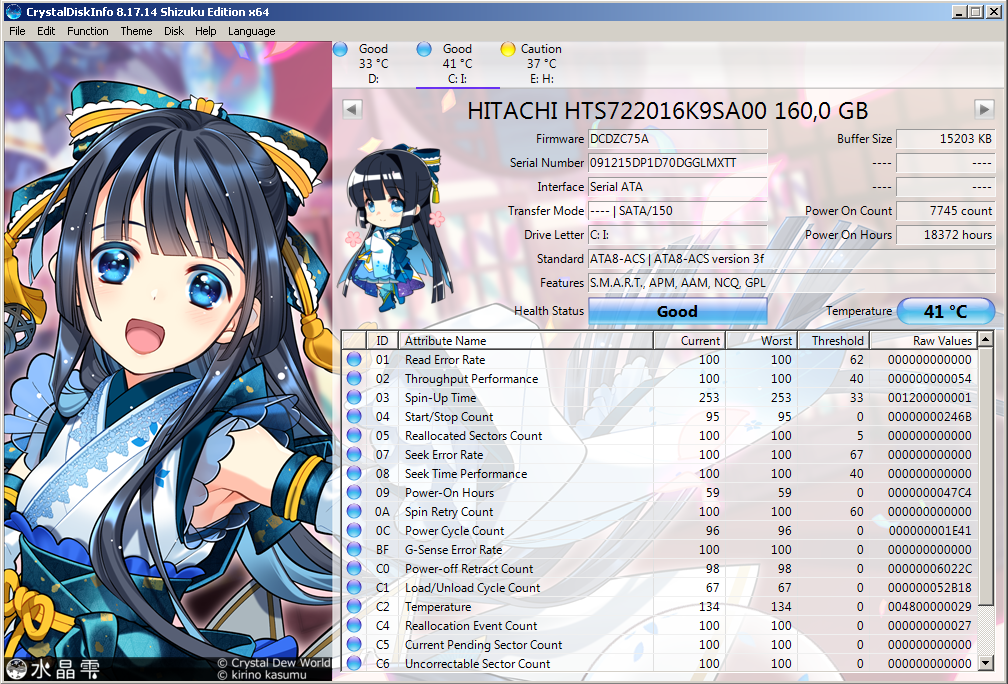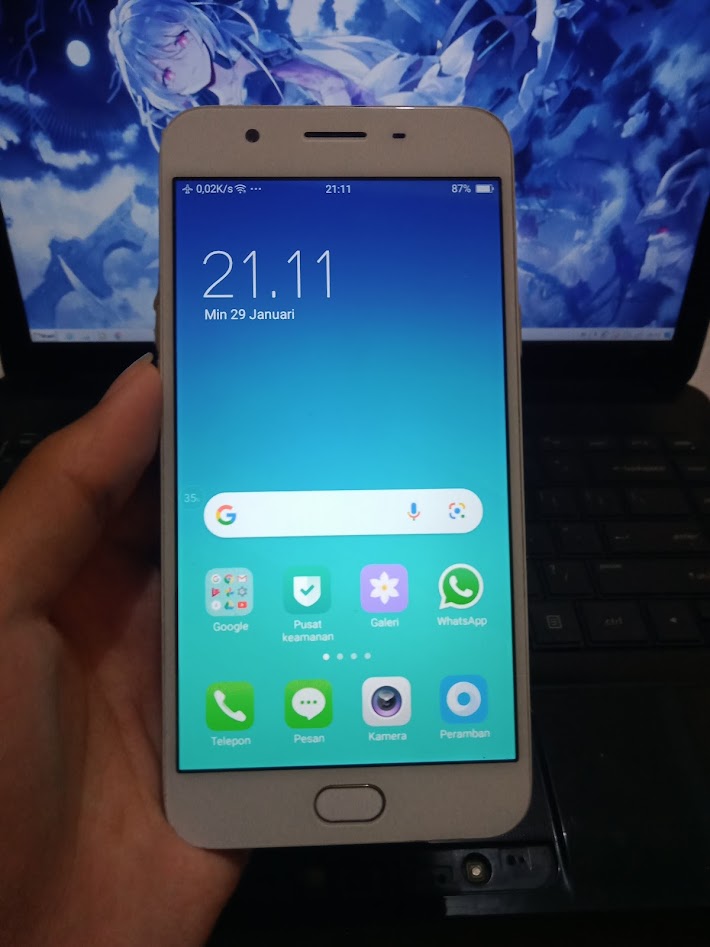Comparing: Hitachi HTS722016K9SA00 vs Samsung KMRX10014M
In this comparison, we analyze two Disks: Hitachi HTS722016K9SA00 and Samsung KMRX10014M, using synthetic benchmark tests to evaluate their overall performance. This side-by-side comparison helps users understand which hardware delivers better value, speed, and efficiency based on standardized testing. Whether you're building a new system or upgrading an existing one, this benchmark-driven evaluation offers valuable insights to guide your decision.

Hitachi HTS722016K9SA00
| Type: | Disks |
|---|---|
| Model: | Hitachi HTS722016K9SA00 |
| Capacity: | 160GB |
| Interface: | SATA-I 1.5Gbps |

Samsung KMRX10014M
| Type: | Disks |
|---|---|
| Model: | Samsung KMRX10014M |
| Capacity: | 32GB |
| Interface: | eMMC |
Specification Comparison Table
This specification comparison presents technical details of several devices or components to help you understand the key differences between each option. Use this table as a reference to determine which device best suits your needs.
| Specification | Hitachi HTS722016K9SA00 | Samsung KMRX10014M |
|---|---|---|
| Brand | Hitachi | Samsung |
| Format | HDD 2.5 | eMMC 5.1 |
| Capacity | 160GB | 32GB |
| Interface | SATA-I 1.5Gbps | eMMC |
Submission Comparison Table
This submission comparison table displays the number and details of benchmark data submissions from various devices or components. This information helps you understand the performance based on the benchmarks that have been tested, as well as providing an overview of the consistency and popularity of the available benchmark results.
Submission Comparison Chart
This chart visualizes the benchmark scores comparison between two hardware devices based on submitted data.
Media Gallery
A collection of photos of tested hardware. These images can help you identify the physical form, model, and variant of the hardware in question. These photos are from our own documentation, and if they are not available we may not be able to document them.
About Hardware Hitachi HTS722016K9SA00
The Hitachi HTS722016K9SA00 is a thick design 2.5-inch hard disk with a capacity of 160GB, designed for laptops and other portable devices. Unlike most laptop HDDs that use a rotation speed of 5400 RPM, this model offers a speed of 7200 RPM, providing a significant improvement in read/write performance, especially in computing tasks that require fast data access.
Equipped with 16MB of buffer cache, this HDD is capable of handling heavier workloads, such as multitasking, application installation, or activities with high I/O intensity. This speed gives it an edge over regular HDDs in terms of response time and efficiency when running an operating system or opening large files. Although its capacity is relatively small when compared to today's storage standards, the HTS722016K9SA00 is still very suitable for use as additional storage or to revive older systems that still rely on 2.5” SATA storage.
The test was conducted using an HP 1000 1b05AU laptop with the following configuration: AMD E1-1200 CPU, 4GB DDR3 RAM (2x2GB in single-channel mode due to CPU limitations), and Windows 7 64-bit operating system. The HDD was installed via an HDD Caddy in place of an optical drive, demonstrating the flexibility of using it as a second storage in a system with an additional SATA slot.
During testing, the drive's performance showed fast response when booting the operating system, opening heavy applications, and performing large file transfers. Despite its limited capacity, the 7200 RPM speed and larger cache compared to 5400 RPM HDDs make it an ideal choice for users who prioritize access speed over large capacity.
The Hitachi HTS722016K9SA00 is still an attractive option for users who want fast yet affordable storage, especially in legacy system configurations or as a secondary drive for modern systems with specific needs.
Tested on:
Device: HP 1000 1b05au (using HDD Enclosure)
Specs:
CPU: AMD E1-1200
OS: Windows 7
RAM: 2x2GB (Does not support dual channel due to limitations of the CPU, currently running single channel mode)
* For CrystalDiskMark the hard drive is directly run on the main sata port, and the hard drive is used as the operating system.
Wednesday, 13 February 2019 12:45:58 | Update: 1 month ago
About Hardware Samsung KMRX10014M
OPPO F1s eMMC 5.1 (Samsung KMRX10014M) is an internal storage chip made by Samsung that is used in the OPPO F1s smartphone. Relying on eMMC 5.1 technology, this chip offers increased data transfer speeds compared to the previous generation (eMMC 5.0), providing a smoother user experience, especially when it comes to opening apps, saving files, and running the Android operating system responsively.
Although not comparable to UFS (Universal Flash Storage) in terms of performance, eMMC 5.1 remains an economical storage solution for mid-range devices like the OPPO F1s. The technology is reliable enough to handle everyday activities such as opening social media, recording videos, taking photos, and storing documents and apps.
The test was conducted on an OPPO F1s device with MediaTek MT6750 specifications, 4GB of RAM, and 32GB of internal storage, running on the Android 6 operating system. The internal storage on the OPPO F1s uses the Samsung KMRX10014M chip, which is an early generation eMMC 5.1 with relatively high performance for the standards of its release time.
Interestingly, despite the device being over 7 years old, testing using the Cross Platform Disk Test (Mobile) showed read speeds of 286.5 MB/s and write speeds of 78.7 MB/s. These figures are impressive for an eMMC chip that has gone through a long usage cycle, and indicate that the Samsung KMRX10014M has good NAND Flash endurance.
Overall, the eMMC 5.1 on the OPPO F1s offers an ideal combination of power efficiency, moderately high performance, and low manufacturing costs. This makes it a very suitable solution for devices with standard to mid-range requirements, especially when first released. While eMMC performance may degrade with age, these benchmark results show that the chip is still capable of performing quite well even after many years.
Device test (testbed):
Device: OPPO F1s
CPU: MediaTek MT6750
RAM: 4GB
Storage: 32GB
OS: Android 6
* This test was conducted after the device was approximately 7 years old, which is likely to have degraded the performance of eMMC.
Friday, 19 November 2021 16:41:45 | Update: 1 month ago


